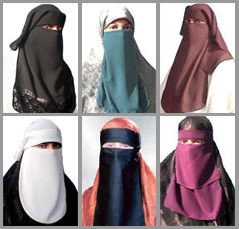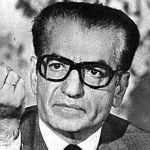Ayatollah Khomeni's Grandson Calls on Bush to 'Occupy' Iran
One might imagine that the grandson of the late Ayatollah Ruhollah Al Khomeini, founder of the Islamic Revolution, would support the Iranian regime. But according to this article from Kuwait's Arabic-language Al-Seyassah, Hossein Khomeini is calling on President George W. Bush to invade and occupy Iran to liberate it from 'religious dictatorship.'
Translated By Nicolas Dagher
June 2, 2006
Kuwait - Al-Seyassah - Original Article
(Arabic, PDF Files, Pages 1 and 42) 
 Like grandfather, like grandson?
Like grandfather, like grandson?
Nope. Hossein Khomeini (above),
the grandson of late Ayatollah
Ruhollah Khomeini (below),
founder of the Islamic Revolution.
 -------------------------------------
-------------------------------------
Ayatollah
Hossein Khomeini  , grandson of Ruhollah Al Khomeini, the founder of the Iranian Republic,
has said that his country is living under a religious dictatorship, governed by the mullahs. He also
defended his call for President Bush to invade Iran!
, grandson of Ruhollah Al Khomeini, the founder of the Iranian Republic,
has said that his country is living under a religious dictatorship, governed by the mullahs. He also
defended his call for President Bush to invade Iran!
During an
interview with the news Web site alarabiya.net, Hossein Khomeini called for the
liberation of Iran from religious rule and Al-Fakih [rule by the
most learned of Islam] and said that the revolution, which was led by his
grandfather against the Shah Mohammad Reza Pahlavi in 1979, had devoured its
children.
[Editor's
Note: Al-Faqih is the doctrine of The Guardianship of the Jurists, which means that
those most knowledgeable about Islamic law should assume a leading political
role in society.  ].
].
This was
a rare interview with Hossein Khomeini, who has avoided the media since touring
Iran three years ago and annoying the Iranian government with some of his comments. Khomeini said
that he knows that his contacts and movements are under surveillance.
In view
of the heated confrontation between his country and the international community
over the nuclear issue, Khomeini said that Iran, "would be powerful if
freedom and a democratic society were being developed there, rather than weapons
and the bomb."
Khomeini
also said that he opposes the Al-Fakih rule and would never accept the
authority of a ruler under Al-Fakih. He added that if he came to power, the
first law that he would implement would make wearing of hijab [headscarf] a
personal decision for women.
 Some color options for
Some color options for
women who wear the Hajib.
--------------------------------------------------
He said, "by
forcing women to wear the strictest, black-colored hajibs, instead of allowing those of different colors, the religious authorities in Iran are unduly restricting
women. Even though I personally support the wearing of some form of hijab, when
female students come out of schools and colleges covered in black, it just makes your heart sick. The hijab issue is a
personal matter. If a woman wants it she can wear it, and if she refuses it,
she doesn't have to. My grandfather Khomeini had lots of relatives that didn't wear
the hijab."
Hossein Khomeini observed that, "my grandfather's revolution devoured its sons and lost its way." He said that when the revolution took place it did not intend to install the Fakih rule, but that all this changed because of the religious thinking that was predominant in religious societies and schools.
He said that the revolution used to call for freedom and democracy, but instead it persecuted its leaders. People like Al Sayyid Al Talkani, who was often imprisoned during the Shah's regime. After the revolution he opposed the breaking of laws and suffered tremendously, having to go in hiding full of sadness over of his actions.
 Like father, like son? In this
Like father, like son? In this
case, perhaps. Reza Cyrus
Pahlavi (above) and his father,
Shah Mohammad Reza Pahlavi
(below).
 -------------------------------------
-------------------------------------
He also condemned the revolutionary tribunals, which continue to practice persecution and beatings in an arbitrary and disorganized fashion. Al Talkani's family was also targeted.
It is well known that the most famous leaders of the Iranian revolution either opposed it afterwards, like Massoud Rajavi who was sentenced to death, or fled the country, like Bani Sadr, or mysteriously disappeared, like Montazeri, Rajaii and Bahchati.
About his call for U.S President George W. Bush to occupy Iran, Hossein Khomeini clarified: "freedom should be promoted in Iran in any way possible, and it is irrelevant whether this freedom comes as the result of domestic or foreign developments. If I were imprisoned, what does it matter? It is in my interests that someone come and break me out of that prison."
In regard to his meeting with the son of the deposed Shah of Iran, Reza Pahlavi, Khomeini said it was an ordinary meeting between two people who share the suffering over a singular problem, which is tyranny, even though each of us comes at it from a different angle."
 ALSO: Christopher Hitchens
Speaks to Hossein Khomeini.
ALSO: Christopher Hitchens
Speaks to Hossein Khomeini.
VIDEO FROM IRAN: 'IMAM KHOMEINI SUPPORTED SEX CHANGE OPERATIONS'
 AL-JAZEERA, iran: Excerpts from a story about sex change operations in Iran, June 2, 2005, 00:05:04, Via MEMRI
AL-JAZEERA, iran: Excerpts from a story about sex change operations in Iran, June 2, 2005, 00:05:04, Via MEMRI
"The first to inspire fatwas on this matter was the Leader of the Revolution - Imam Khomeini. Four decades ago, before he came to power in Iran, Khomeini adopted this position, and became, as some claim, the first Muslim cleric to deal with sex change."

Finding sex-change relief in Iran